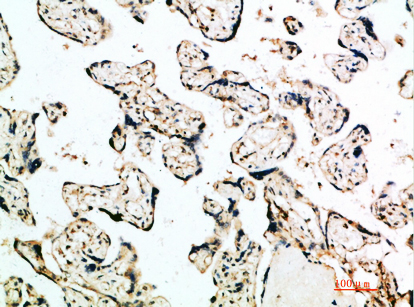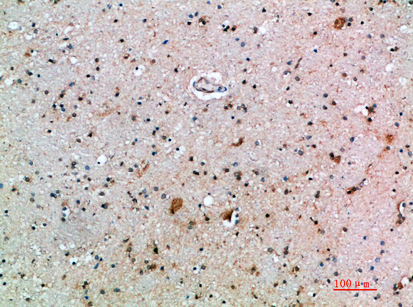IFN-β Polyclonal Antibody
- Catalog No.:YT5964
- Applications:IHC;IF;ELISA
- Reactivity:Human;Rat;Mouse;
- Target:
- IFN-β
- Fields:
- >>Cytokine-cytokine receptor interaction;>>PI3K-Akt signaling pathway;>>Necroptosis;>>Osteoclast differentiation;>>Toll-like receptor signaling pathway;>>NOD-like receptor signaling pathway;>>RIG-I-like receptor signaling pathway;>>Cytosolic DNA-sensing pathway;>>JAK-STAT signaling pathway;>>Natural killer cell mediated cytotoxicity;>>TNF signaling pathway;>>Alcoholic liver disease;>>Shigellosis;>>Yersinia infection;>>Chagas disease;>>Tuberculosis;>>Hepatitis C;>>Hepatitis B;>>Measles;>>Human cytomegalovirus infection;>>Influenza A;>>Human papillomavirus infection;>>Kaposi sarcoma-associated herpesvirus infection;>>Herpes simplex virus 1 infection;>>Epstein-Barr virus infection;>>Human immunodeficiency virus 1 infection;>>Coronavirus disease - COVID-19;>>Lipid and atherosclerosis
- Gene Name:
- IFNB1 IFB IFNB
- Protein Name:
- Interferon beta (IFN-beta) (Fibroblast interferon)
- Human Gene Id:
- 3456
- Human Swiss Prot No:
- P01574
- Mouse Gene Id:
- 15977
- Mouse Swiss Prot No:
- P01575
- Immunogen:
- Synthetic peptide from human protein at AA range: 91-140
- Specificity:
- The antibody detects endogenous IFN-β
- Formulation:
- Liquid in PBS containing 50% glycerol, 0.5% BSA and 0.02% sodium azide.
- Source:
- Polyclonal, Rabbit,IgG
- Dilution:
- IHC 1:50-200, ELISA 1:10000-20000. IF 1:50-200
- Purification:
- The antibody was affinity-purified from rabbit antiserum by affinity-chromatography using epitope-specific immunogen.
- Concentration:
- 1 mg/ml
- Storage Stability:
- -15°C to -25°C/1 year(Do not lower than -25°C)
- Other Name:
- Interferon beta (IFN-beta;Fibroblast interferon)
- Background:
- This gene encodes a cytokine that belongs to the interferon family of signaling proteins, which are released as part of the innate immune response to pathogens. The protein encoded by this gene belongs to the type I class of interferons, which are important for defense against viral infections. In addition, type I interferons are involved in cell differentiation and anti-tumor defenses. Following secretion in response to a pathogen, type I interferons bind a homologous receptor complex and induce transcription of genes such as those encoding inflammatory cytokines and chemokines. Overactivation of type I interferon secretion is linked to autoimmune diseases. Mice deficient for this gene display several phenotypes including defects in B cell maturation and increased susceptibility to viral infection. [provided by RefSeq, Sep 2015],
- Function:
- function:Has antiviral, antibacterial and anticancer activities.,online information:Clinical information on Avonex,online information:Clinical information on Betaseron,pharmaceutical:Available under the names Avonex (Biogen), Betaseron (Berlex) and Rebif (Serono). Used in the treatment of multiple sclerosis (MS). Betaseron is a slightly modified form of IFNB1 with two residue substitutions.,similarity:Belongs to the alpha/beta interferon family.,subunit:Monomer.,
- Subcellular Location:
- Secreted.
- Expression:
- PCR rescued clones,
PCSK9 inhibition interrupts the cross talk between keratinocytes and macrophages and prevents UVB-induced skin damage. Wenjie Guo IF Mouse skin tissue
A HER2-targeting antibody-MMAE conjugate RC48 sensitizes immunotherapy in HER2-positive colon cancer by triggering the cGAS-STING pathway. Cell Death & Disease Yanhong Gu WB Mouse,Human MC38 cell, CT26 cell,HT29 cell,468 cell,ZR-75-1 cell
- June 19-2018
- WESTERN IMMUNOBLOTTING PROTOCOL
- June 19-2018
- IMMUNOHISTOCHEMISTRY-PARAFFIN PROTOCOL
- June 19-2018
- IMMUNOFLUORESCENCE PROTOCOL
- September 08-2020
- FLOW-CYTOMEYRT-PROTOCOL
- May 20-2022
- Cell-Based ELISA│解您多样本WB检测之困扰
- July 13-2018
- CELL-BASED-ELISA-PROTOCOL-FOR-ACETYL-PROTEIN
- July 13-2018
- CELL-BASED-ELISA-PROTOCOL-FOR-PHOSPHO-PROTEIN
- July 13-2018
- Antibody-FAQs
- Products Images

- Immunohistochemical analysis of paraffin-embedded human-placenta, antibody was diluted at 1:200

- Immunohistochemical analysis of paraffin-embedded human-brain, antibody was diluted at 1:200



